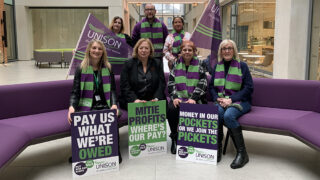Failure to honour the minimum wage is endemic across the care sector as many homecare workers are unpaid for the time they travel between home visits – which can be up to a fifth of their working day, says UNISON today (Thursday).
The union is urging the government to end the systematic underpayment that it believes is widespread in the sector, by tweaking minimum wage regulations so employers are forced to make pay calculations easier to understand.
Confusing wage slips mean workers struggle to see how they are being paid, so it’s difficult for them to challenge their employers, says UNISON.
Although homecare companies claim to be paying the minimum wage, their failure to pay travel time means that staff are often being paid well below the legal minimum*.
UNISON also wants to see HM Revenue & Customs (HMRC) publish a report – commissioned by the government over a year ago – into six major care companies and potential breaches of minimum wage laws.
Most homecare employees work in isolation and rarely see colleagues so it’s difficult for them to compare their experiences. And even when companies are successfully challenged by individuals over their failure to pay for travel time, these tend to be dealt with on a case-by-case basis.
If caught out for failing to pay for travel time, firms seldom make amends and correct the payments across the whole of the workforce, says UNISON.
The issue of unpaid travel time was recently highlighted when UNISON backed a case against Sevacare – one of the largest homecare providers in the UK – on behalf of Judith Montgomery, from Bury in Greater Manchester.
Judith’s case resulted in an award of £3,250 for withheld travel time payments, equivalent to nearly 500 hours at the then national minimum wage rate of £6.70 per hour, when her case was brought in March 2016.
Judith regularly worked split shifts spanning 15 hours in a day, yet Sevacare did not pay her travel time between client visits. As a result she could start work at 7am and finish as late as 10.30pm (having done breakfast, tea and bed runs), but still be underpaid by up to £60 a week.
UNISON says it should not be for individual low-paid workers (often on zero- hours contracts) to stand up to each employer when the government – and HMRC in particular – should be making sure that employers are paying a legal wage.
And when firms are caught not paying the minimum wage because they don’t pay for travel time, HMRC should step in to ensure that appropriate payments are made to the rest of the staff, says UNISON.
UNISON has started a recruitment drive amongst homecare workers in the North West, Yorkshire & the Humber and the East Midlands to offer them the support of the union and bring individual workers together.
UNISON has been leading the campaign to get the government to enforce the national minimum wage in the sector. The union believes this is the only way to improve pay for all homecare workers, not just those who take cases to court.
UNISON general secretary Dave Prentis said: “Homecare workers support the elderly and vulnerable across the UK, yet they continue to be paid below the minimum wage. The government promised to act, but so far ministers have abjectly failed to help these low-paid workers.
“Homecare firms who only pay their staff for the face-to-face time they spend with their clients are guilty of law-breaking on a grand scale. The increasing use of 15-minute visits places untold pressure on homecare workers, yet their pay doesn’t reflect the importance of the work they do.
“Judith’s case shows just how companies can profit by denying staff payment for their travel time. The government should be doing far more to ensure these firms meet their legal obligations across the board.”
Notes to editors:
– Judith Montgomery, who now works in a residential care home, said: “My service users became like a family to me and I didn’t want to let them down. I worked on a zero-hours contract and would be paid only for time spent in my clients’ homes, never for the time spent travelling between them. So I could be paid for 30 hours a week but actually worked many more.
“I started work at 7am doing breakfasts, and would get home after the bed run at 10.30pm, yet I would only get paid for six or seven hours. I’d be on the go all day, I was shattered and it took a toll on my health.”
– UNISON in South Wales recently investigated homecare workers employed by MiHomecare and identified up to 100 who were owed as much as £2,500 each for unpaid travel time.
– *Workers aged 25 and over are paid the national living wage of £7.20 an hour, which came into force in April 2016. Those under 25 are paid the national minimum wage, which is £6.70 for 21-24 year olds and £5.30 for those aged 18-20.
– UNISON is calling for the government to make regulations, as provided for by section 12 of the National Minimum Wage Act, requiring employers to supply workers with a statement demonstrating that they are complying with either the national minimum wage or the national living wage.
– UNISON’s report on 15-minute homecare visits, Calling time on illegal wages in the homecare sector is available on the UNISON website.
Media contacts:
Peter Urwin T: 0161 661 6720 M: 07950 262 300 E: p.urwin@unison.co.uk
Anthony Barnes T: 0207 121 5255 M: 07834 864794 E: a.barnes@unison.co.uk
Liz Chinchen T: 0207 121 5463 M: 07778 158175 E: l.chinchen@unison.co.uk







